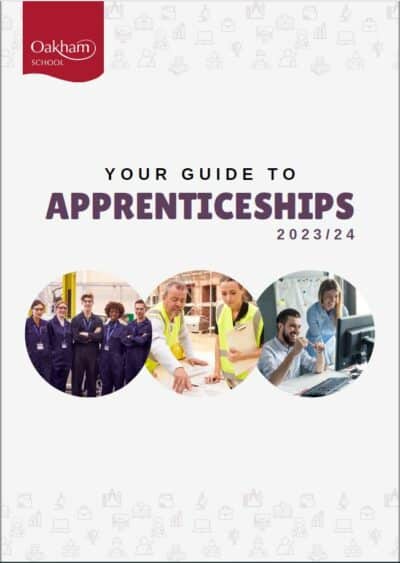
To coincide with National Apprenticeship Week Caroline Atkinson, Oakham School’s Work Experience & Apprenticeships Officer, explores the increasing popularity of Degree Apprenticeships.
What are Degree Apprenticeships?
The word ‘apprenticeship’ tends to conjure up an idea of apprenticeships of old where you took a trade after leaving school and stayed with it for life. The new modern Degree Apprenticeships are a far cry from this, allowing students to still have a taste of the freedom of university life, learn essential life skills, gain essential work experience but without the increasing debt that comes with university. Students will be earning a wage and yes, you do come out with the same degree.
The apprenticeship experience can start straight from school with the Intermediate (Level 2) equivalent to 5 GCSEs, Advanced (Level 3) equivalent to 3 A-levels, Higher Levels 4 and 5 equivalent to a Higher National Certificate (HNC), Higher National Diploma (HND) or Foundation Degree (FD) and the Degree Level 6 and 7 equivalent to the bachelor’s and master’s degree respectively.
How do Degree Apprenticeships work?
Students completing a Degree Apprenticeship will spend 80% of their time in their workplace and 20% outside of work in a learning environment. How the time is divided is dependent on the course, the employer, and the university. Some allocate a day a week to university, and some do block weeks where students are out a full week or a month. Students on a Degree Apprenticeship will be treated the same as a normal employee and will receive the normal allocation of holiday. Apprentices are usually given a mentor within the workplace and a Tutor/Assessor from the university/provider to help them with the academic side.
The company will pay for all the student’s university fees from their Apprenticeship Levy thus making them invested in the success of the Apprentice. Latest UK Government statistics showed that after finishing their apprenticeship, over 77% of apprentices stay with the same employer, 46% received a pay rise and 36% reported getting a promotion.
Whilst students applying to university can choose which university they would like to go to, on an apprenticeship they are told which university they will be attending. This is due to several reasons including location of the employer or university running that course. Queen Mary University of London was the first Russell Group university to launch apprenticeships back in 2015 and since then there have been over 90 other universities joining them including Exeter and Nottingham Trent to mention some. Students must also apply for the job via the company as opposed to applying to the university.
Are Degree Apprenticeships the softer option to university?
Definitely not! Currently there are no specific sites dedicated to advertising every apprenticeship available. This will change after 2025 when UCAS will be taking over the reins, but this is very much still in its infancy. Students therefore must research and find apprenticeships they would like to apply for and fill in individual applications for each job as opposed to applying to university with one form, so it is a long process.
Having no debt and earning a wage are appealing, however, apprentices do not get the same long holidays that university students get and some struggle to adjust to working life post A-levels. Some Degree Apprenticeships also have their courses online which would lessen further the experience of university life. Balancing working life and academic expectations can also be a challenge to some unprepared students.
How does Oakham School help students interested in Degree Apprenticeships?
We support our students on a one-to-one basis through the Degree Apprenticeship application process by helping them to find relevant apprenticeship jobs and to complete the application. We advise our students on when interviews, aptitude/verbal tests and assessment days are offered making sure that they have the tools, skills, and confidence to navigate their way through the process. The process itself is not dissimilar to the process of obtaining a graduate job.
What types of employer offer Degree Apprenticeships?
Whilst not every sector is represented yet, there are certainly strong opportunities in certain sectors such as Finance, Engineering, Cyber Security and Law.
One employer who has invested heavily in apprenticeships is Amazon. There are variety of choices such as a Level 6 Chartered Management Degree and Project Management for anyone interested in Business or the Level 6 Finance Apprenticeship for those interested in Accountancy.
Unilever also offer a variety of apprenticeships which fit into their three streams – Business and Technology, Research and Development, and the Supply Chain – giving opportunities across their offices, factories, and research laboratories.
Another sector which has many opportunities is Law where companies such as Irwin Mitchell and Pinsent Masons are offering a solicitor apprenticeship equivalent to going to university but with the student gaining all the daily experience, salary, and no debt.
Read our Oakham School Guide to Apprenticeships
For more information, contact Caroline Atkinson, our Work Experience & Apprenticeships Officer at cla@oakham.rutland.sch.uk






